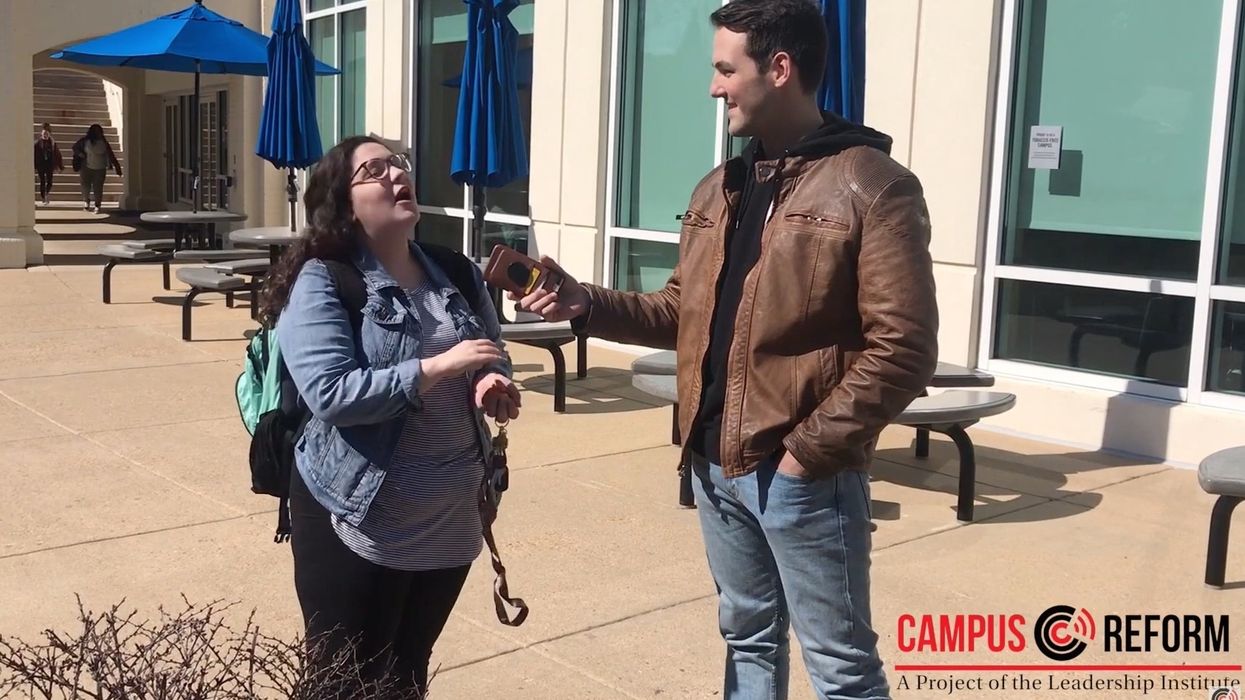
Image source: Campus Reform video screenshot

President Trump set to sign EO that would penalize colleges that don't protect First Amendment rights
Some Virginia college students told Campus Reform that hateful, offensive, or rude speech should not be considered free speech on college campuses.
President Donald Trump is expected to sign an executive order Thursday afternoon that would penalize colleges that don't protect the First Amendment on their campuses. Schools that don't uphold free speech would face losing billions in research grants from a dozen federal agencies.
Ahead of the president's executive order, Campus Reform's Cabot Phillips asked students at Marymount University in Arlington, Virginia, what they believed should and shouldn't be permitted as free speech on their campus.
Several students told Campus Reform that they believe hateful or disrespectful speech crosses the line between what should and shouldn't be allowed on campus.
"I think if it's, like, hateful and, like, disrespectful to specific groups, then that's not OK," one student said.
Another student shared a similar opinion.
"It's OK to disagree but you have to do it respectfully and in an adult manner because if you're gonna talk about free speech, then you need to back it up with facts and not just your personal opinion," the student responded when asked about free speech.
"But as far as having the right to speak up, I'm allowed to be disrespectful, right?" Phillips asked.
"No," she answered.
"The First Amendment says I can speak out," he said.
"I mean, if you wanna be an a**hole, that's your life choice," she continued.
Another student said students who make offensive comments should be removed from campus.
"I should be allowed to speak but ... if you're directly offending someone with like racial slurs, then I mean you should be escorted off campus or asked to stop," he said.
One student said she agreed that people have a right to free speech but only it doesn't negatively affect others.
"I understand you have free rights to say what you want about people but when it's, like, negatively impacting our school as a whole and other students around you, that's crossing the line," the student said.
The executive order, which the president teased during his speech at the Conservative Political Action Conference earlier this month, is intended to stop colleges from silencing conservative voices on campus.
"If they want our dollars, and we give it to them by the billions, they've got to allow people like Hayden and many other great young people and old people to speak," Trump said, the Christian Broadcasting Network reported. "Free speech. If they don't, it will be costly."
The order would require public universities to uphold free speech and private universities would be expected to uphold open inquiry on campus, USA Today reported.
"It will be applied consistently with how agencies already condition federal grants. I won't get into implementation details," a senior Trump administration official told reporters Tuesday on a phone call. "But schools are already supposed to be following these rules. Essentially, each agency already conditions grants, and schools are certified after following these conditions, and it will just add free speech as one of those conditions."
Student loans and grants would not be affected by the order.
The values of free speech and open inquiry have been under attack on many higher learning campuses in recent years.
A number of schools have banned conservative speakers including Ben Shapiro, editor-in-chief of the Daily Wire, and best-selling author Jordan Peterson.
Last month, Grand Canyon University in Arizona, the largest Christian University in the U.S., blocked Shapiro from speaking on campus.
"Our decision to cancel Shapiro's speaking engagement is not a reflection of his ideologies or the values he represents, but rather a desire to focus on opportunities that bring people together," GCU wrote in a statement.
"As a university, we encourage thoughtful discussions and rational dialogue in our classrooms about the issues affecting our society, and we encourage students to put greater emphasis on actions that produce positive change in our society," the university continued.
Students: First Amendment Shouldn't Protect Offensive Speechyoutu.be